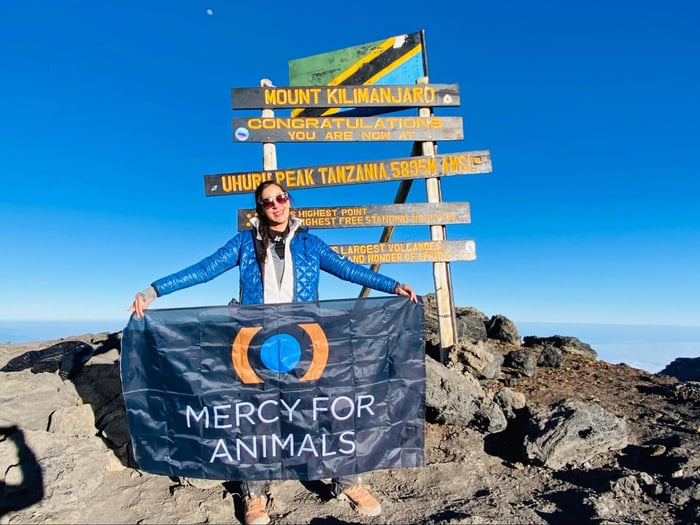 Photo: Jennifer Stojkovic
Photo: Jennifer Stojkovic
Jennifer Stojkovic is on a mission to diversify food systems to be more inclusive of women and people of color. In many ways, she’s continuing the work of generations of women who’ve been fighting for civil rights and equality.
As the founder and CEO of the Vegan Women Summit (VWS), she’s in a unique position to realize this vision through a formidable network and a visible platform.
This year, VWS returns on 8 April, in Los Angeles at City Market Social House and is set to feature inspirational panels and keynotes from CEOs, celebrities and athletes, including Miyoko Schinner, Tabitha Brown, and Maggie Baird. There will also be a marketplace with over 30 of the world's most exciting plant-based and sustainable brands.
abillion is the event’s official social media network and we will be there on the ground to capture and share with our audience how dynamic changemakers are championing veganism through their businesses and their lives.
In advance of the Summit, we sat down with Jennifer to chat about her motivations, whether she’s met any of her objectives, and how a tragic murder turned her vegan.
We understand that you worked in Silicon Valley in the tech industry prior to starting VWS. What were some ways that your work experience helped you in this mission?
In terms of my work in Silicon Valley, I was fortunate to spend seven years working on the ground with both the largest tech companies in the Bay Area as well as tons of emerging startups. I quickly learned around 2018 that food technology is really going to be the next big technology in this space. And so my goal became to help make food tech as popular as the mainstream tech industry.
I found that my experience has helped me understand that innovation is needed for this ecosystem. And really just how much support we need to put in – as leaders – to help grow and nurture the startups in this space. We can bring everything that has gone well with the tech industry in terms of the culture of innovation to the food system.
At the same time, there are many things that did not go well in the tech industry, such as the lack of diversity in leadership that we need to avoid.
 Photo: Jennifer Stojkovic
Photo: Jennifer Stojkovic
What was your mission when you started the Vegan Women’s Summit? Why is this important?
My mission when I started Vegan Women's Summit was to inspire, educate, and empower women to bring compassion to their careers. So our goal is to help elevate women's leadership in the future of food, whether they are founders, team members that join plant-based or food tech companies, or become investors. We want to show women that there is a place for them to become leaders in this industry.
Currently, across the world, less than three percent of all venture capital funding goes towards women founders. So we need to make sure that we turn the curve and help to get that representation in the future of food.
Vegan Women Summit started in 2020. What are some significant changes you’ve noticed over the past two years in this space?
VWS started in 2020 and it's been two crazy years. A lot has changed in this space and we have seen a massive influx of investment and capital.
In areas where there were one or two companies in the category, now there could be eight, nine or ten. We also are seeing companies emerging all over the world.
I just finished writing a piece in Rolling Stone talking about women of color founders across Africa, South Asia, and South America, who are all founding food tech companies. So certainly the democratization of capital has been a big change that I have seen.
 Photo: Jennifer Stojkovic
Photo: Jennifer Stojkovic
In a previous interview with Vegconomist, you mentioned that one of the KPIs you set for yourself was to “increase the leadership of women, particularly women of color, at all levels in the plant-based and animal alternatives industry.” How have these KPIs been met in the past year and what are your predictions in the years to come?
So in the past year, there's a few ways that we have been able to tackle these goals. First off at VWS Pathfinder – that's our global pitch competition that's focused on women founders – we have now reached over 1,000 women founders around the world in 31 countries.
More than 70 percent were women of color, which is an increase from the year before. That's really exciting to see that we're continuing to reach more and more women founders to connect them with opportunities.
Last year, we connected over 2,000 job seekers, also primarily women and women of color, with roles at major plant-based and food tech companies such as Impossible Foods, Miyoko’s, Beyond Meat, you name it. All of the big companies worked with us to help fill some of their roles and create their talent pipeline.
I predict in years to come that we will be reaching even more women. I'm excited about growth in certain parts of the world. We're seeing a lot of growth in Oceania, Australia and New Zealand – lots of companies popped up there. New Zealand in particular is really interesting and we’ve seen so many companies come out of there. We also have lots more companies coming out of South America, Africa and India as well.
 Photo: Jennifer Stojkovic
Photo: Jennifer Stojkovic
In your upcoming book, The Future of Food is Female, you mentioned you had almost no relationship with your daily food choices or how food ended up on your plate despite growing up outside of Toronto surrounded by farm life. Could you tell us more?
It was very interesting because I was surrounded by factory farming in my small town. I was young and not aware that that's what it was. Because you grow up seeing these things as normal, you don't realize that they are indeed intensive farming operations. I think that I was not able to make the connection between food and animals because I was brought up to be desensitized to it and to not see anything wrong or abnormal about the way that animals are being farmed around me.
You mentioned that you made the connection suddenly, and everything came to a ‘screeching halt’ when a personal tragedy occurred. Could you share more about this?
In terms of how I made the connection to veganism, I experienced a very tragic episode of my life. When I was very young, my husband’s best friend, who was also the Best Man of our wedding was senselessly murdered. And when we came to terms with something as tragic as a murder and having to go through a murder trial, and all the grief that comes with such a traumatizing event, we decided to take a look at our personal decisions.
We did a lot of introspective work to think about our impact in the world and we ultimately decided to forgive the murderer. My husband actually went to the prison to see him in person and forgive him for what he had done.
We decided that if we could make that kind of compassionate choice that we certainly had to bring compassion to every other aspect of our lives. And thus, we went vegan shortly after, very much for ethical reasons as a way to help heal our hearts and souls after something so traumatic had happened to us.
 Photo: Jennifer Stojkovic
Photo: Jennifer Stojkovic
How do you think VWS and the events here can be relatable to non-vegan women? Is there a message you would like to share with them?
VWS is relatable because it is really showing women that they can be a part of something bigger than themselves, and to really have a moment and an opportunity to be part of a mission-driven industry.
Many professionals that I speak to on a daily basis have decided that they want to get into the vegan business space, because the pandemic has really shown them a few things. First, that life is short. The days really add up when you're sitting in front of a Zoom screen every day doing something that you don't care about.
More importantly, it also showed many of the issues involved with our food system and how fragile our planet really is. So, you know, those few things combined have really caused many women to reach out to us about how they can get involved in the space, whether or not they're even vegan themselves.
This is a huge focus of what we do and it’s similar to what you do with abillion. We want to show people that you can be a part of building a kinder, more sustainable world, whether you invest in the space, start a company, get a job in the industry or whether you simply want to support women doing something that is better for the world – everybody has the opportunity to support our work.
So breaking down those barriers is very important to us when it comes to reaching people around the world who aren’t vegan yet.
 Photo: Vegan Women Summit (VWS)
Photo: Vegan Women Summit (VWS)










